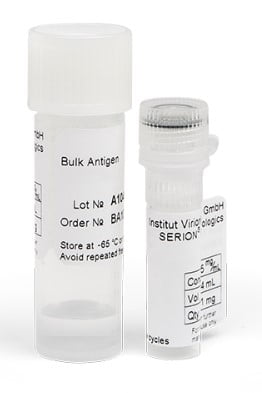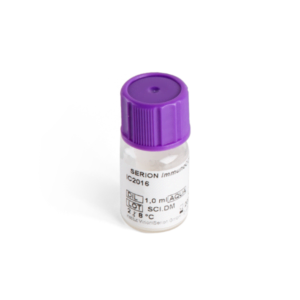| Weight | 1 lbs |
|---|---|
| Dimensions | 9 × 5 × 2 in |
| target | Mycoplasma pneumoniae P1 |
| species reactivity | Mycoplasma pneumoniae |
| applications | ELISA |
| assay type | Indirect & quantitative |
| available size | 1 mg |
Mycoplasma pneumoniae P1 Antigen BA127VSP1
$1,168.00
Summary
- Virion/Serion Immunologics Antigen for research use (RUO)
- Mycoplasma pneumoniae P1 Antigen, recombinant
- Suitable for detection of IgA, IgG & IgM antibodies in ELISA
- Lot specific concentration, specified in mg/mL
- 1 mg
Mycoplasma pneumoniae P1 Antigen BA127VSP1
| kit |
|---|
| Research area Infectious Disease |
| Storage Store at -65°C or lower. Avoid repeated freeze-thaw cycles. 10 years from date of manufacture (under recommended storage conditions). |
| Form liquid |
| Associated products Mycoplasma pneumoniae Antigen (BA127VS) Mycoplasma pneumoniae P1 Antigen (BA127VSP1) Mycoplasma pneumoniae IgA Control Serum (BC127A) Mycoplasma pneumoniae IgG Control Serum (BC127G) Mycoplasma pneumoniae IgM Control Serum (BC127M) Mycoplasma pneumoniae IgA ELISA Kit (ESR127A) Mycoplasma pneumoniae IgG ELISA Kit (ESR127G) Mycoplasma pneumoniae IgM ELISA Kit (ESR127M) |
| target relevance |
|---|
| Organism Mycoplasma pneumoniae |
| Protein names Mycoplasma pneumoniae |
| Structure and strains Mycoplasma pneumoniae is a very small bacterium in the class Mollicutes. It is a human pathogen that causes the disease mycoplasma pneumonia, a form of atypical bacterial pneumonia related to cold agglutinin disease. M. pneumoniae is characterized by the absence of a peptidoglycan cell wall and resulting resistance to many antibacterial agents. The persistence of M. pneumoniae infections even after treatment is associated with its ability to mimic host cell surface composition. |
| Detection and diagnosis The variety of clinical symptoms of atypical pneumonias and possible causative agents requires a diagnosis that is not exclusively limited to the clinical picture. Serological and direct detection methods can be employed to identify the pathogen and so enable appropriate medical intervention strategies. The direct detection of Mycoplasma pneumoniae by cultivation is difficult and time-consuming. Faster results are achieved by complement fixation tests (CFT). Meanwhile, sensitive and specific ELISA tests are available in order to differentiate between immunoglobulin classes so improving the diagnostic value of the results obtained. |
Data
Publications
| pmid | title | authors | citation |
|---|---|---|---|
| We haven't added any publications to our database yet. | |||
Protocols
| relevant to this product |
|---|
| BA127VSP1 protocol |
Documents
| Product data sheet |
|---|
| BA127VSP1 |
Only logged in customers who have purchased this product may leave a review.
















Reviews
There are no reviews yet.